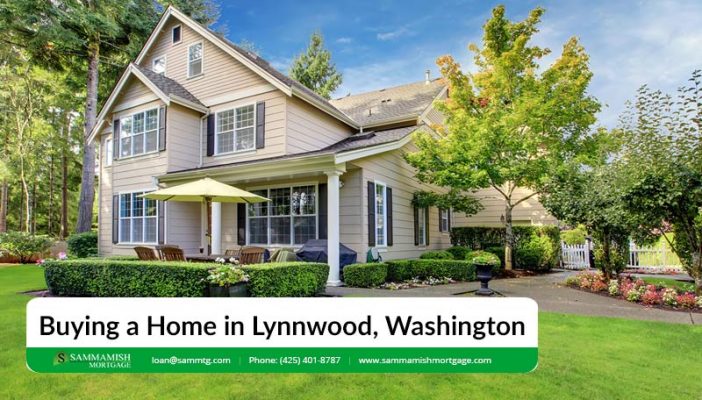No Obligation and transparency 24/7. Instantly compare live rates and costs from our network of lenders across the country. Real-time accurate rates and closing costs for a variety of loan programs custom to your specific situation.

This post is part of an ongoing series of articles for buyers across the state of Washington. Today, we’ll take a look at Lynnwood, Washington to help you come up with an effective strategy for getting into the housing market. The following information will be helpful for prospective home buyers who are looking to purchase a home in Lynnwood.
At a glance: Lynnwood is a city in Snohomish County and is considered a part of the Seattle Metro Area. The city is about 16 miles north of Seattle and 13 miles south of the city of Everett, making it a centralized center and an ideal location to live, work, and play. According to the latest available census data, Lynnwood’s population is currently about 38,500. Despite its close proximity to Seattle – which is one of the most expensive housing markets in Washington – Lynnwood’s housing market is much more affordable.
While the actual home that you buy will need to be looked at in-depth to make sure it fits your lifestyle and needs, it’s also important to get to know the local real estate market that you are looking to buy in.
Understanding the Lynnwood housing market is key to making a well-informed purchasing decision and will impact the value of your home now and into the future. Getting a feel for the temperature of the market when buying a home in Lynnwood is an important first step in the home buying transaction.
Generally speaking, the prices of homes in Lynnwood are much lower than in nearby Seattle, despite the close distance between the two cities. That said, home prices in Lynnwood also tend to be higher than the statewide average. Of course, this may not always be the case, but it tends to ring true over the course of history of these real estate markets. This is an important fact for all home buyers to know before buying a home in Lynnwood.
Buyers should also understand that the temperature of housing markets changes all the time. The market could be ‘hot’ during one period, then ‘cool’ not long after. Understanding the temperature of the market is important because it will determine the amount of housing supply available for sale, how prices will behave, and how fast buyers may have to move to make an offer on a home.
The average price for homes in Lynnwood rose sharply over the past few years, then tapered off by mid-2018. In fact, this trend occurred in many centers throughout the state of Washington, including Seattle. Yet while home prices plateaued and even dipped from mid-2018 to mid-2019, they picked up again.
Understanding the current housing market in Lynnwood is an essential step for prospective buyers. The price of a home is certainly not cheap. Buying a home is likely the biggest investment anyone will ever make. So, it’s only fitting that buyers take the time to get to know the market to approach their home buying strategy appropriately and effectively.
Inventory plays a key role in housing markets and the prices that sellers can get when they list their homes. It also plays a role in the prices that buyers can expect to pay for a home.
For the past few years, housing inventory has been very tight in Snohomish County, as well as nearby King County and the cities within it. Tight inventory means that there aren’t as many homes available for sale for buyers, which means there is less to choose from. And tight inventory often means prices are being driven up. Considering how attractive Lynnwood is to live in, it’s no surprise that inventory is typically under what is considered to be a balanced market.
Low levels of available inventory in Lynnwood are fostering competition among buyers, similar to other parts of the Seattle Metro Area. Considering this, it doesn’t take long for homes in Lynnwood to go pending. Tight inventory seems to be a common trend in the entire state of Washington.
Buying a home in Lynnwood comes with a slew of expenses in addition to the down payment and purchase price of the home. When a purchase transaction closes, there are a number of expenses that you will need to cover, which are referred to as ‘closing costs‘.
Generally speaking, closing costs range from anywhere between 2% to 5% of the purchase price of a home. These expenses can include things such as:
As you would imagine, these costs can add up to a hefty sum. Buyers are encouraged to budget appropriately in order to have the funds available to cover these costs when a real estate transaction closes.
As mentioned already, a down payment is a necessary part of a real estate purchase transaction, unless you are eligible for a zero-down VA loan or are in an all-cash deal. The down payment will go towards the purchase price of the home, and the remaining balance will need to be mortgaged.
Considering the size of down payments, it’s important to understand how much you’ll need to come up with when buying a home in Lynnwood. The down payment amount you will have to pay will depend on a few things, including the following:
To illustrate how much you can expect to pay, let’s say the home you are buying costs $600,000. With an FHA loan, the minimum down payment amount is 3.5%, which would work out to $21,000. If you were to put down 20% towards the purchase price of the home (which is the minimum needed on a conventional loan to avoid Private Mortgage Insurance), you would be looking at paying $120,000.
As you can see, the down payment amount can vary a great deal. Make sure to work with an experienced mortgage company in Lynnwood to help you work out a deal you are comfortable with and able to afford.
The mortgage interest rate that you are charged will greatly influence the overall cost of your mortgage. The lower the rate, the less you will have to pay in interest. Therefore, your mortgage will be more affordable. Lower rates are given to borrowers with a healthy credit score and financial profile.
A higher rate, on the other hand, will make your mortgage more expensive. Higher rates are charged to those with a lower credit score and weaker financial profile, making them more of a risk to lenders.
The rates also differ among different mortgage products. Rates for 30-year fixed-rate mortgages versus 15-year fixed-rate mortgages, for instance, will differ slightly. Be sure to understand the exact interest rate for the various mortgage products available so you know how much your mortgage will cost you.
Getting informed of the real estate market in Lynnwood and the median home prices you can expect to pay will help ensure that you are prepared as an educated buyer. Take the time to get educated in the market and get your finances in order. It’s also important to team up with a seasoned real estate agent and mortgage company to help increase the odds of a successful transaction.
Do you have questions about home loans in Lynnwood? Or are you ready to buy a home in Lynnwood and are ready to apply for a mortgage? If so, Sammamish Mortgage can help. We are a local mortgage company from Bellevue, Washington serving the entire state, as well as Oregon, Idaho, and Colorado. We offer many mortgage programs with flexible qualification criteria. Contact us today with any questions you have about home loans or to get an instant rate quote.


Whether you’re buying a home or ready to refinance, our professionals can help.
{hours_open} - {hours_closed} Pacific
No Obligation and transparency 24/7. Instantly compare live rates and costs from our network of lenders across the country. Real-time accurate rates and closing costs for a variety of loan programs custom to your specific situation.